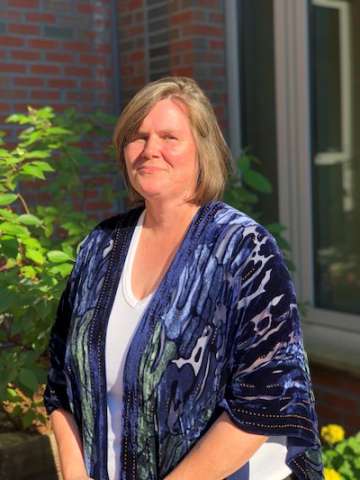
Striving for a World Free of Abuse: A Q&A with Bloomberg Fellow Erin Miller
August 13, 2020
Early in her career, Erin Miller felt called to do anti-racism work. She quickly discovered the connections between racism and sexual violence, eventually shifting her work toward preventing domestic abuse and sexual assault. Over the years, she has held different but related roles: overnight staff in a women’s shelter, rape crisis advocate, LGBTQ program director in a domestic and sexual violence program, and others. Eventually, she realized that relatively few victims seek help directly through sexual violence organizations. Instead, doctor’s offices and hospitals were much larger gateways for those in need of these services.
“When I stumbled across this research, I figured I might be in the wrong place,” she says. “I needed to take my passion and knowledge and move it into a different context.”
Now Erin is the Equity, Inclusion, and Abuse Prevention Officer at Newton-Wellesley Hospital, a nonprofit medical center located in the suburbs of Boston that is part of a larger healthcare network that includes Massachusetts General Hospital and Brigham and Women’s Hospital. Her work helps to drive hospital and state policy on public health and social equity issues. We spoke with Erin about how preventing abuse requires a systems approach.
What drives you, and how did this bring you to your interest in public health?
What drives me is a passion for social justice and empowering historically marginalized and oppressed peoples, including my own. At this moment in my life, I do that work in a healthcare context. This has led me to understand the great power and promise of healthcare providers, and the great need to go beyond the individualized models of care and change so often present in healthcare contexts.
What public-health related work have you done that you’re most proud of?
Some of my best work has been in places where I am largely invisible. I have had the privilege of serving others who are themselves agents of change in Orthodox Jewish faith communities (not normally places where I would be welcomed, much less offered leadership). Serving others in those spaces, assisting them to craft culturally and Halachically-appropriate models of primary prevention, and helping empower them to create radical change in their communities has been some of the work of which I am most proud. This work has been small on a public health scale, but massive given that the communities in question rarely embrace change as a positive.
What question or problem in your community keeps you up at night?
There are many questions that keep me up at night, among them finding the most effective ways to end childhood sexual abuse and other forms of developmental trauma. Children and, where present, their protective parents are often caught in big systems that are seldom abuse-aware, much less trauma-informed. Even systems that are specifically designed to end child abuse are too often complicit in aggravating the original harm. We can do better. We have to do better. To quote Bill Shore, the founder of hunger-ending nonprofits Share Our Strength and No Kid Hungry, “Good is not good enough when people are suffering.”
How has COVID-19 impacted your work?
It has made everything harder. COVID has laid bare all the things that our system doesn’t do well. Specifically, it has laid bare structural barriers to equity, such as racism, xenophobia, lack of adequate language access, and poverty. It has also exacerbated abuse dynamics, aggravated mental health and substance use disorders, and created whole new barriers for deaf/hard-of-hearing communities. In short, it has been both a multilayered, continually unfolding disaster—as well as an opportunity to start reimagining our work and our systems. I have worked harder since March than I have in quite some time.
What impact do you hope you to make as a Bloomberg Fellow?
I have been inspired by the organizations Generation 5 and Black and Pink, and by Dr. Robert W. Block, all of whom, admittedly in very different ways, talk about envisioning a world free of abuse. What would that world look like and how do we get there? I am hoping the Bloomberg School can give me the tools to better contribute to building that future.
Connect With Us
Receive all the latest news from the Initiative by signing up for the American Health Dispatch newsletter, subscribing to the American Health Podcast, and subscribing to our YouTube channel.
Contact Us